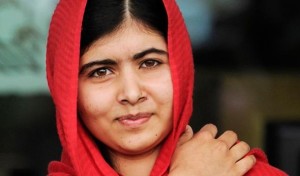Malala, the Nobel, and Meaningful Peace
“And now I know that you must not be afraid of death. And you must move forward. You must go forward, because education and peace are very important.”– Malala Yousafzai
It’s not every year that the Taliban weighs in on the decision of the Nobel Committee. This year, however, the decision to award the prestigious award to the Organization for the Prohibition of Chemical Weapons delighted the Pakistani Taliban. In fact, Islamists the world over have made condemnation of Malala a near-viral trend. Assed Baig, formerly of Islamic Relief in the United Kingdom and a prolific commentator on all things he perceives to be anti-Muslim, doesn’t see Malala as a young Muslim woman defying stereotypes and fighting against those most often responsible for the oppression and murder of fellow Muslims — the Taliban and their Islamist compatriots. Instead, he paints Malala’s story this way:
“This is a story of a native girl being saved by the white man. Flown to the UK, the Western world can feel good about itself as they save the native woman from the savage men of her home nation. It is a historic racist narrative that has been institutionalised…The story of an innocent brown child that was shot by savages for demanding an education and along comes the knight in shining armour to save her.”(Huffington Post, July 2013.)
Also appearing in the Huffington Post was this piece by a young woman named Sofia Ahmed, writing from the UK. To Sofia, Muslims who speak out in support of Malala and against Islamism are “nefarious” attention-seeking propagandists, and the West’s “feminist crusade” is responsible for the abuses of women so rampant within our own Muslim community.
As American Muslim blogger Meriam Sabih so capably pointed out, Assed Baig and Sofia Ahmed’s attacks on Malala dismiss her personal bravery, ignore the universality of her message, and perpetuate the misogynist honor culture responsible for the silencing and brutalization of Muslim women worldwide. It doesn’t matter to Baig and Ahmed that Pakistani doctors were in part responsible for saving Malala’s life. In the eyes of Baig, Ahmed, and others like them, when Muslim women speak out their efforts are nothing but Western fabrications, imperialist conspiracies, and sources of shame for Islamist men. Sabih highlights, and we agree, that these condemnations of Malala and the West are eerily similar to comments made by the Pakistani Taliban’s Adnan Rasheed in a letter he wrote to Malala this summer. Ultimately, while many Islamists don’t share the violent tendencies of the Taliban, their disdain for women, individual liberty, and dissent is part of the same dangerous supremacist ideology of political Islam.
Sadly, the Nobel Committee seems to share the same views about who should “represent” Muslim women. In 2011, they awarded Tawakkol Karman with the Nobel Peace Prize for what they call her “struggle for the safety of women and for women’s rights to full participation in peace-building work.” Ms. Karman has declared Mohamed Morsi the “Arab world’s Mandela” and is a senior member of Yemen’s Muslim Brotherhood affiliated al-Islah party. How can a leading figure within a movement seeking to restricts women’s most basic liberties, including that of freedom from genital mutilation, be awarded such a prestigious award in the name of women’s rights?
When the Nobel Committee dissented with the chorus of voices calling for Malala to be honored, did they do so because they truly believe that the failed effort to obliterate chemical weapons represents successful peace? Or, were they reluctant to take on the threat of Islamism by supporting the teenage girl who strikes fear in the Taliban? Not having participated in their discussions, we will never really know. What we do know is that supporting young women like Malala and young men who share her commitment to individual liberty is the only way that the world will achieve a meaningful and lasting peace. Regrettably, Western governments (including the Obama administration) have often failed to ally with liberty-minded Muslims and have instead placated Islamists and their sympathizers.
It is certainly true that liberty-minded Muslims have a difficult road ahead. Not only do we face vicious onslaughts from Islamists and their supporters, but we must also work against a suffocating tide of cultural relativism and decades-old policies which stifle those voices calling out for freedom. Granting Malala Yousafzai the Nobel Peace Prize would have been the right thing to do, signaling to the world that those who stand with courageous voices for reform understand that the key to peace is courage in the face of monsters like the Taliban.
Of course, Malala’s courage is not diminished because it was not recognized by the Nobel Committee. Millions of young Muslims, girls and women in particular, are emboldened by her example and inspired by her message. People of all religions and none have been inspired to make positive change. Ultimately, that is the greatest prize any activist could hope for.

